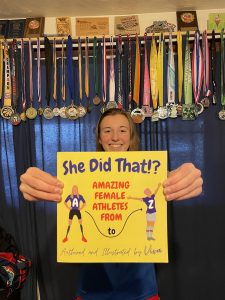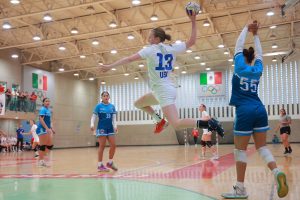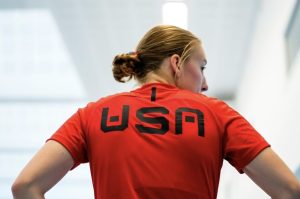- Slug: Sports-Viva Kreis Handball, 2,400 words.
- 3 photos available.
By Aaron Decker
Cronkite News
PHOENIX – “Bonjour” and “Merci beaucoup” are the common phrases Viva Kreis has come to use on a daily basis. The 19-year-old Arizona State athlete isn’t preparing for a French final exam, nor does she reside in a Tempe dorm room.
Instead, Kreis lives over 5,000 miles away in a small apartment in a small town in France, where she trains four hours a day to prepare for a sport that’s foreign to most people in the United States. Her goal is to achieve the highest level of athletic excellence all while trying to meet deadlines for her homework assignments.
There might not be anyone better suited for tackling these new challenges than Kreis, who has already accumulated a mountain of awards, accolades and accomplishments. At Pittsburgh’s Belle Vernon Area High School, Kreis was a three-sport athlete, the class president in all four years, a National Merit Scholar Award winner, a devoted community service participant and was awarded the Heisman High School Scholarship for her community-minded service. The resume continues to grow to heights seemingly as large as Machu Picchu, which yes, she has hiked.
For Kreis, there is a new mountain top to reach. As a player for the U.S. Women’s National Team Handball Team, she is focused on winning a world championship this summer with the squad, but most of all she has her eyes set on competing in the 2028 Summer Olympics. Alongside her athletic journey, Kreis advocates for women’s sports through creative outreach, an endeavor that has already allowed her to write, illustrate and publish her first book.
If an Olympic dream and uplifting the women’s game wasn’t enough, she still has a college degree to earn.
“If you don’t think that your own dreams are crazy, then why should anybody else be able to tell you that they are? So I think that’s just the motto that I’ve used to continue just pursuing one thing after another,” Kreis said.
The European game
In middle school, Kreis came across handball, a sport that mixes playstyles of basketball and soccer. In its simplest form, two teams face off against each other with the desire to score more points by throwing a soccer-like ball into the goal of the opposing team. Unlike soccer, players can use their hands to pass and throw the ball across the rectangular court. Handball is one of the most popular sports in Europe, while in the United States, its exposure is limited to just 20-40 clubs across the country.
Despite a lack of handball opportunities, Kreis pursued the game by applying to the U.S. National teams’ Youth Advisory Council, where she was accepted and ran the team’s TikTok account with the hope of spreading the game of handball through social media. While serving as a social media ambassador, she tried out and was selected by the junior national team. Despite her skills and considerable drive, the leap to the next skill level requires more training, which there is little opportunity for in the U.S.
“There were no opportunities for me to play handball in the United States so I had to move to Europe, where it’s the second biggest sport after soccer,” Kreis said.
In 2023, Kreis and her mother Mary sold their home in Pennsylvania and departed to the bucolic French town of Saint-Amand-les-Eaux, which has a population of 36,134, to train with a professional French handball team. When Kreis isn’t practicing and competing, she is studying for her degree through ASU’s Walter Cronkite School of Journalism and Mass Communication’s online program.
The goal is to train with elite handball athletes who have been playing the sport since they were 5 years old. The popularity of handball in countries like Germany and Norway has allowed European countries to dominate the sport in the Olympics. The United States handball teams have only qualified a handful of times for the Games, which is something that will change in 2028, when the U.S. handball team will have an automatic bid due to the Summer Olympics being hosted in Los Angeles.
Compared to the French players, Kreis is late to playing handball, only beginning her pursuit in middle school. The time spent playing the sport is just one aspect that Kreis has had to overcome since moving to France. Most of Kreis’ teammates don’t speak English, but they have adapted to the language barrier by speaking as much English as they can or connecting on other levels such as playing rock, paper, scissors.
“It’s really difficult to express yourself and have the same personality that you do when your entire team speaks French, and only a few of them speak English,” Kreis said. “But they’ve all been really welcoming and just supportive.”
Despite the obstacles, Kreis brings a work ethic to handball that has caught the eye of her junior national team coach Hendrik Schultze. During his time coaching Kreis, he saw that she was the first one to arrive at camp and the last one to leave. From Schultze’s point of view, the training Kreis put in transformed her from a player with more of a basketball and running background to a player who could be a threat on the court.
“From the level of work she’s putting in, I would say she’s really a role model of what we expect,” Schultze said. “We’re very happy to have someone like Viva, who’s so dedicated, basically, going to Europe and dedicating everything or really mostly to handball.”
Kreis acknowledges that to be on par with her European counterparts there is more work to do, but the signs suggest that the move to France is paying off. In December, Kreis was awarded the North American and Caribbean Continental Championships All-Tournament Team Best Left Wing. It doesn’t hurt either that the junior national team has qualified for two world championships.
“Viva is definitely one of the players who was among this group, which not only has an amazing story to tell, but going forward, if she stays injury-free and stays on this course of developing and dedicating herself, she could be easily a member of this national team for the next 10 years as long as she wants to play handball,” Schultze said.
On the horizon is the 2028 Summer Olympics – the ultimate goal. For Kreis, the opportunity to be an Olympian at her age would complete a dream she has had since she was 4 years old. Even with Kreis’ impressive growth in handball, the next four years will require her to continue to train and improve her game.
“You always have to be at your A-game training hard and you got to stay focused because nothing’s guaranteed,” Kreis said.
There is no guarantee that the handball team will resemble what it looks like today. Schultze recalls that the team looked very different two years ago, and with the help of Kreis as an ambassador for the game, there could be possible growth by 2028. Schultze is hoping that the game of handball won’t only expand in the next few years through grassroot efforts, but also that sponsorships will increase as well.
To amplify the game, Schultze chose Kreis to help start a podcast that can help broaden the sport alongside her usual duties of contributing to the team’s social media presence. The coach ultimately looked toward Kreis to be an ambassador for a few reasons. One was her extreme dedication to the game and that she represented a new generation of American players who were picking it up. Most of all, he looked to her because she has so eloquently expressed herself in the past before.
The book
When Kreis was little her mother would read her a plethora of books, but one that stood out in Kreis’ memory was a book on famous Olympians. What lingered in Kreis’ recollection was that all the athletes were male.
“I couldn’t really imagine myself doing what they were doing because I didn’t look like them and I didn’t have, maybe, all the physical abilities that they did,” Kreis said.
The memory of not seeing herself reflected in the pages of accomplished athletes simmered until she was in high school, when she realized she could write her own book that would make sure no girl felt the way she did.
“Little girls can read this book and say, ‘I can be like Billie Jean King, I can be like Ann Meyers Drysdale, you know, they look like me and I play that sport,’” Kreis said. “We can teach little boys that girls can do just as much as they can, if not more. I think that’s when it just really hit me that if nobody else is going to do it, then I can do it.”
Still in her teens, and with the same work ethic that led to her excelling in high school and in handball, she became the author, artist, and publisher of her book, “She Did That!? Amazing Female Athletes from A-Z”. The children’s book highlights a female athlete for each letter in the alphabet. Every athlete has an accompanying poem that Kreis wrote. Although she doesn’t consider herself an artist, Kreis decided to forgo finding an artist and instead made the art herself.
“I actually had a lot of fun just picking the athletes and what famous pose they were in,” Kreis said. “Then of course, it’s all four-line poems, so trying to find words that rhymed and the rhyme scheme and how many syllables were in each line.”
The culmination was a book that was released in January 2023. Over a year later, Kreis has already seen the results of exposing young girls to female athletes. Her grandfather shared a book with a neighbor’s granddaughter who wasn’t being treated well by the boys on her soccer team. When the girl read Kreis’ book, she learned about soccer star Megan Rapinoe and was inspired to see a player who was a girl who “could do all the things that the boys could do, and win all the awards and just be her authentic self.”
The book is just one of many advocacy ventures Kreis has been involved within the last few years. When she was 14, Kreis saw a commercial that revealed that 50% of girls will drop out of sports. The message led to Kreis asking her mother if she could send a letter to the WNBA asking if she could interview players for her National History Day project on the history of women’s basketball and the WNBA breaking barriers.
“She’s 14 and I’m thinking, you know, how do you tell a kid (that) writing a letter doesn’t work, you know, who’s going to read it, right?” Kreis’ mother, Mary, said.
Against the odds, the WNBA did touch base and allowed Kreis to interview players, coaches and executives while visiting all 12 WNBA teams. What started as a project to expand the conversation of women’s sports eventually swelled to Kreis giving speeches and having the WNBA create a video on her story.
Today, Kreis is pursuing a degree in journalism at ASU and hopes to use her career to cover women’s sports. Her experience with the WNBA showed her that role models can be more than just the athletes on the court but the ones off the court as well.
How does she do it?
Kreis’ ability to accomplish so much at such a young age and her fearless desire to pursue so many different avenues can be traced to her role models growing up. The handball athlete points to her mother, grandmother and grandfather as pivotal figures in her upbringing.
Her grandfather, Arvid, was an avid fan of women’s sports and, according to Mary, instilled a desire for adventure and exploration. Her grandmother, Karen, possessed a love of research and reading that rubbed off onto Kreis. The pursuit of education was instilled in her family to the point that Kreis said she felt it was almost an internal desire for her.
Mary is an advocate for veterans and has helped coordinate multiple projects, such as sock drives. Kreis tagged along on Walmart trips to collect food and clothing for veterans, becoming a sponge to advocacy efforts.
“Through the years, she was a part of all of those projects that I participated in, and so I think it was just a part of her life to do those kinds of things,” Mary said.
The accomplishments and success Kreis has fostered come at a price, mainly in her time. Kreis can be in only so many places at once, which means some experiences for a young person don’t make the cut. In high school, Kreis was beginning her handball journey and embarking on speaking engagements while sacrificing time away from friends.
“I think my friends kind of struggled with how to feel about it and how to react with everything,” Kreis said. “I would sometimes come back from a handball trip and nobody would really say anything.”
Along with navigating the distance between friends, Kreis missed out on several high school events, such as the state cross country meet which she qualified to compete in. By her side was her mother, who tried to console her daughter.
“I kept telling her through high school, ‘They don’t know how to talk to you, they don’t know how to ask you about how your trip was, and how your handball experience was,’” Mary said. “They don’t mean to neglect. They just don’t know how to ask you because you’re different. But then for a teenage girl, you don’t want to be different.”
Mary, a college professor, continues to aid her daughter in whatever way she can. She tagged along with Kreis to France to be by her daughter’s side as she trains. When Mary isn’t teaching, she volunteers with the national handball team to help the players and coaches.
Kreis is a product of a family that encouraged education, athletics and advocacy, but ultimately she is the catalyst of her own results. Schultze put into words what ultimately makes Kreis able to achieve everything she has attained.
“If we talk about Viva, we talk about her doing a lot of things and not thinking about a lot of things,” Schultze said. “She does think but she does a lot of things, so if you want to create something, start doing and then get the feedback and then adjust.”
Initially, Mary said she was going to name her daughter Olivia, but ended up deciding on Viva which translates to “long live.”
“She has fulfilled the meaning of her name, she just is alive,” Mary said. “She’s intense about everything but a smooth intensity. It’s passion. It’s just passion.”
For more stories from Cronkite News, visit cronkitenews.azpbs.org.


